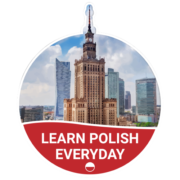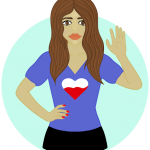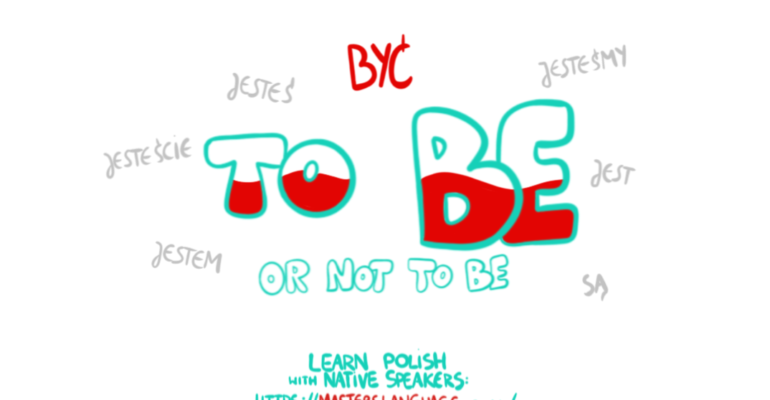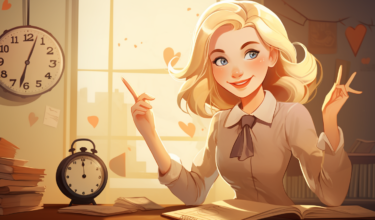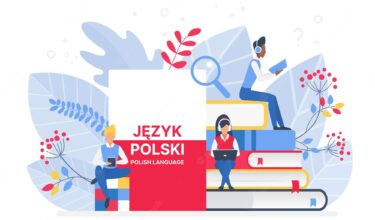The Polish verb “BYĆ” – to be.
February 17, 2022 2022-03-08 15:26The Polish verb “BYĆ” – to be.
VERB CONJUGATION
- Polish verbs are conjugated in 6 different ways in order to fit the personal pronouns.
- Since grammar is a key part of the Polish language, let us take a closer look at the verb “BYĆ” (to be), as it is one of the first verbs most learners come across.
- Verb “BYĆ” is irregular and has 3 tenses: present, past, future.
PRESENT TENSE – “BYĆ” (to be)
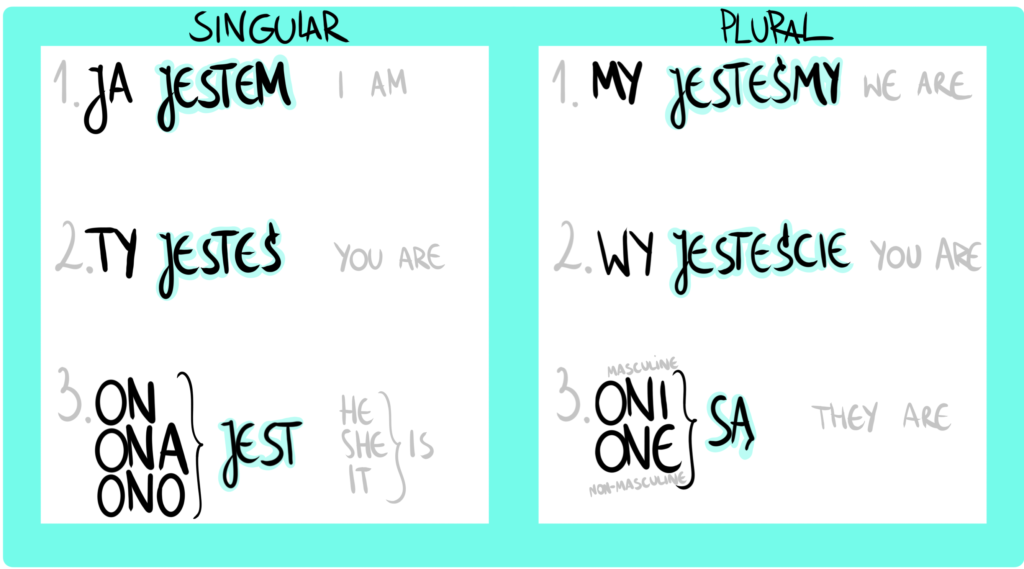
PAST TENSE – “BYĆ” (to be)
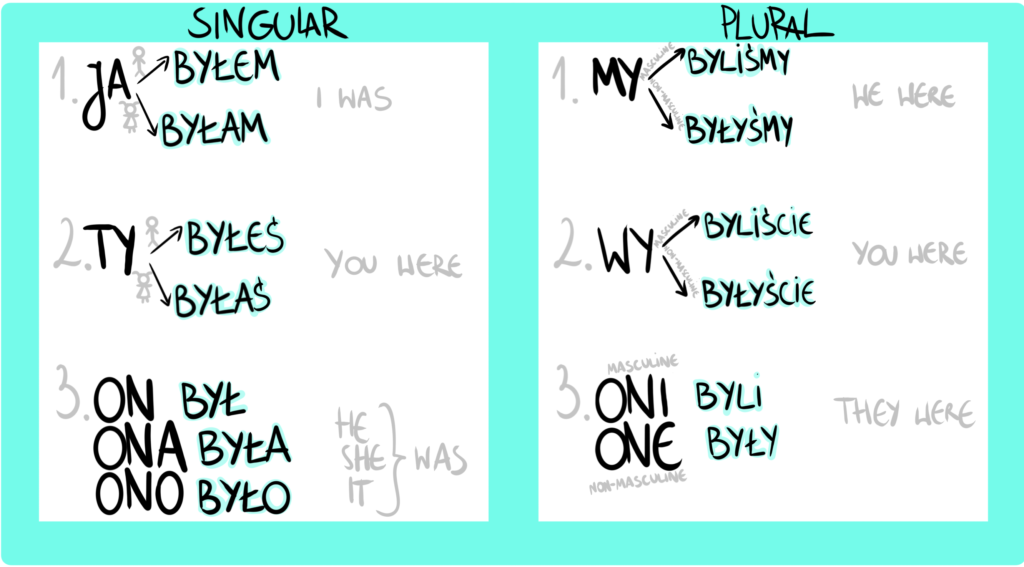
FUTURE TENSE – “BYĆ” (to be)
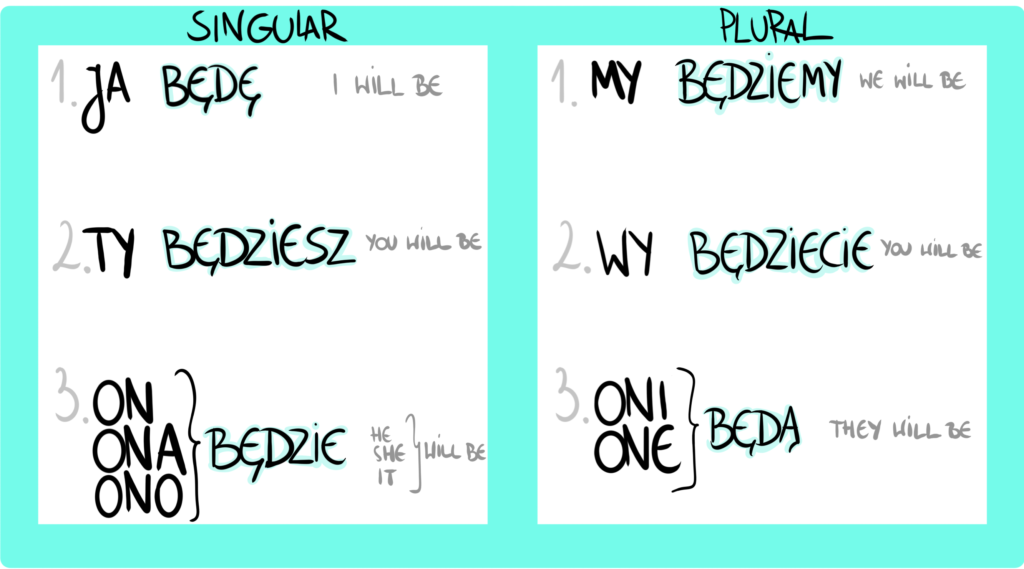
EXPRESSING FEELINGS AND EMOTIONS
- If you want to express your feelings or emotions, you can say:
- present tense: JESTEM GŁODNY. (“głodnA” if you’re a girl)
I am hungry. - past tense: BYŁEM GŁODNY. (“byłAm głodnA” if you’re a girl)
I was hungry. - future tense: BĘDĘ GŁODNY. (“głodnA” if you’re a girl)
I will be hungry.
- present tense: JESTEM GŁODNY. (“głodnA” if you’re a girl)
- “BYĆ” + basic adjectives
 |  |  |  | |
| szczęśliwy | szczęśliwa | szczęśliwi | szczęśliwe | happy |
| smutny | smutna | smutni | smutne | sad |
| głodny | głodna | głodni | głodne | hungry |
| zmęczony | zmęczona | zmęczeni | zmęczone | tired |
| znudzony | znudzona | znudzeni | znudzone | bored |
| zdziwiony | zdziwiona | zdziwieni | zdziwione | surprised |
| zmieszany | zmieszana | zmieszani | zmieszane | confused |
| podekscytowany | podekscytowana | podekscytowani | podekscytowane | excited |
| zakochany | zakochana | zakochani | zakochane | in love |
- SENTENCE EXAMPLES – present tense
(Ja) jestem szczęśliwy/a. – I am happy
(Ty) jesteś szczęśliwy/a. – You are happy
(On) jest szczęśliwy. – He is happy.
(Ona) jest szczęśliwa. – She is happy.
(Ono) jest szczęśliwe. – It is happy.
(My) jesteśmy szczęśliwi. – We are happy.
(Wy) jesteście szczęśliwi/szczęśliwe. – You are happy.
(Oni) są szczęśliwi. – They are happy.
(One) są szczęśliwe. – They are happy.
(Ja) jestem smuty/a. – I am sad.
(Ty) jesteś smutny/a. – You are sad.
(On) jest smutny. – He is sad.
(Ona) jest smutna. – She is sad.
(Ono) jest smutne. – It is sad.
(My) jesteśmy smutni. – We are sad.
(Wy) jesteście smutni/smutne. – You are sad.
(Oni) są smutni. – They are sad.
(One) są smutne. – They are sad.
(Ja) jestem głodny/a. – I am hungry.
(Ty) jesteś głodny/a. – You are hungry.
(On) jest głodny. – He is hungry.
(Ona) jest głodna. – She is hungry.
(Ono) jest głodne. – It is hungry.
(My) jesteśmy głodni. – We are hungry.
(Wy) jesteście głodni/głodne. – You are hungry.
(Oni) są głodni. – They are hungry.
(One) są głodne. – They are hungry.
(Ja) jestem zmęczony/a. – I am tired.
(Ty) jesteś zmęczony/a. – You are tired.
(On) jest zmęczony. – He is tired.
(Ona) jest zmęczona. – She is tired.
(Ono) jest zmęczone. – It is tired.
(My) jesteśmy zmęczeni. – We are tired.
(Wy) jesteście zmęczeni/zmęczone. – You are tired.
(Oni) są zmęczeni. – They are tired.
(One) są zmęczone. – They are tired.
(Ja) jestem znudzony/a. – I am bored.
(Ty) jesteś znudzony/a. – You are bored.
(On) jest znudzony. – He is bored.
(Ona) jest znudzona. – She is bored.
(Ono) jest znudzone. – It is bored.
(My) jesteśmy znudzeni. – We are bored..
(Wy) jesteście znudzeni/znudzone. – You are bored.
(Oni) są znudzeni. – They are bored.
(One) są znudzone. – They are bored.
(Ja) jestem zdziwiony/a. – I am surprised.
(Ty) jesteś zdziwiony/a. – You are surprised.
(On) jest zdziwiony. – He is surprised.
(Ona) jest zdziwiona. – She is surprised.
(Ono) jest zdziwione. – It is surprised.
(My) jesteśmy zdziwieni. – We are surprised.
(Wy) jesteście zdziwieni/zdziwione. – You are surprised.
(Oni) są zdziwieni. – They are surprised.
(One) są zdziwione. – They are surprised.
(Ja) jestem zmieszany/a. – I am confused.
(Ty) jesteś zmieszany/a. – You are confused.
(On) jest zmieszany. – He is confused.
(Ona) jest zmieszana. – She is confused.
(Ono) jest zmieszany. – It is confused.
(My) jesteśmy zmieszani. – We are confused.
(Wy) jesteście zmieszani/zmieszane. – You are confused.
(Oni) są zmieszani. – They are confused.
(One) są zmieszane. – They are confused.
(Ja) jestem podekscytowany/a. – I am excited.
(Ty) jesteś podekscytowany/a. – You are excited.
(On) jest podekscytowany. – He is excited.
(Ona) jest podekscytowana. – She is excited.
(Ono) jest podekscytowany. – It is excited.
(My) jesteśmy podekscytowani. – We are excited.
(Wy) jesteście podekscytowani/podekscytowane. – You are excited.
(Oni) są podekscytowani. – They are excited.
(One) są podekscytowane. – They are excited.
(Ja) jestem zakochany/a. – I am in love.
(Ty) jesteś zakochany/a. – You are in love.
(On) jest zakochany. – He is in love.
(Ona) jest zakochana. – She is in love.
(Ono) jest zakochany. – It is in love.
(My) jesteśmy zakochani. – We are in love.
(Wy) jesteście zakochani/zakochane. – You are in love.
(Oni) są zakochani. – They are in love.
(One) są zakochane. – They are in love.
- DESCRIBING PEOPLE
 |  |  |  |
| Jestem wysoki. I am tall. Jest wysoki. He is tall. | Jestem wysoka. I am tall. Jest wysoka. She is tall. | Jesteśmy wysocy. We are tall. Są wysocy. They are tall. | Jesteśmy wysokie. We are tall. Są wysokie. They are tall. |
| Jestem niski. I am short. Jest niski. He is short. | Jestem niska. I am short. Jest niska. She is short. | Jesteśmy niscy. We are short. Są niscy. They are short. | Jesteśmy niskie. We are short. Są niskie. They are short. |
| Jestem ładny. I am pretty. Jest ładny. He is pretty. | Jestem ładna. I am pretty. Jest ładna. She is pretty. | Jesteśmy ładni. We are pretty. Są ładni. They are pretty. | Jesteśmy ładne. We are pretty. Są ładne. They are pretty. |
- “BYĆ” + personal information



